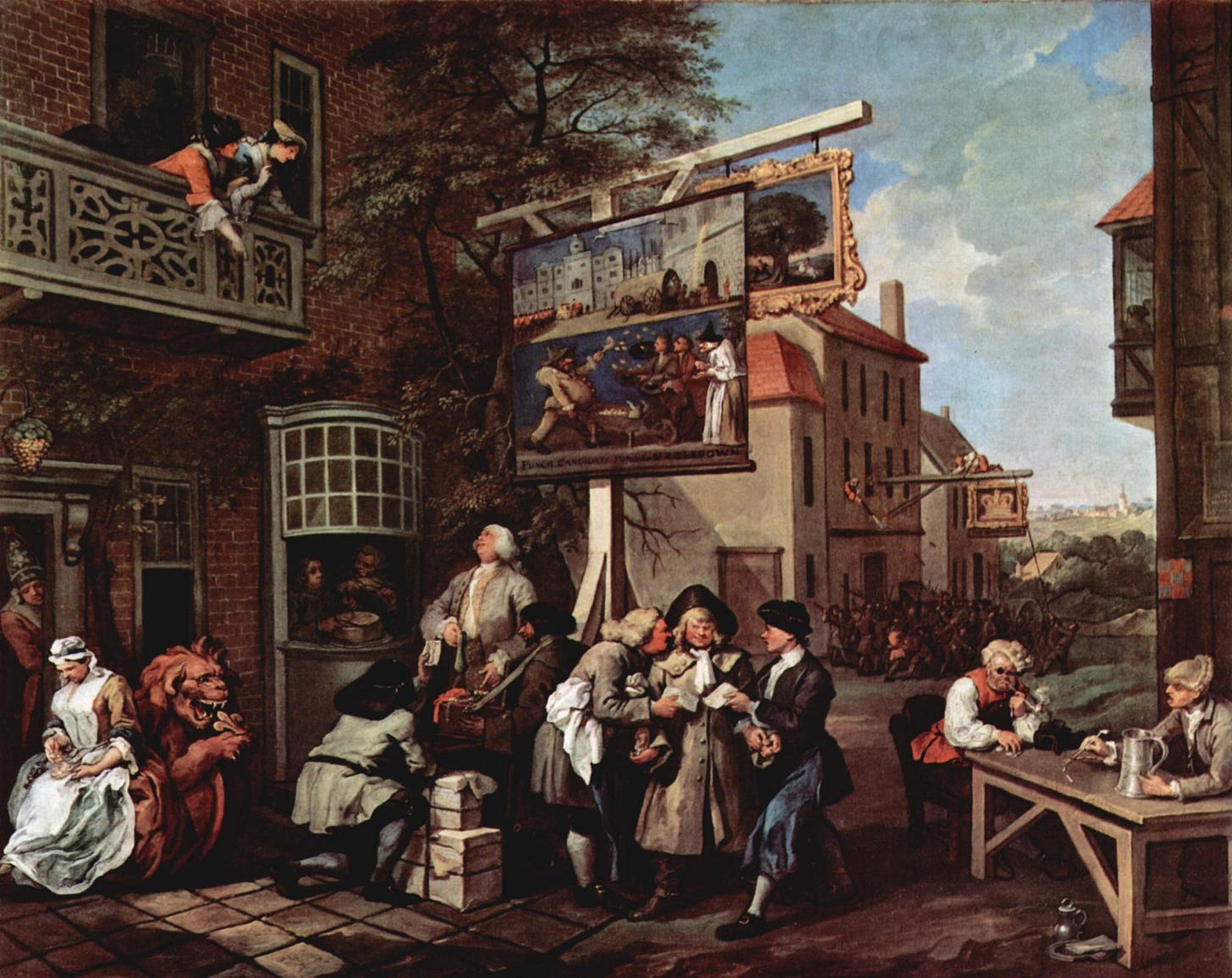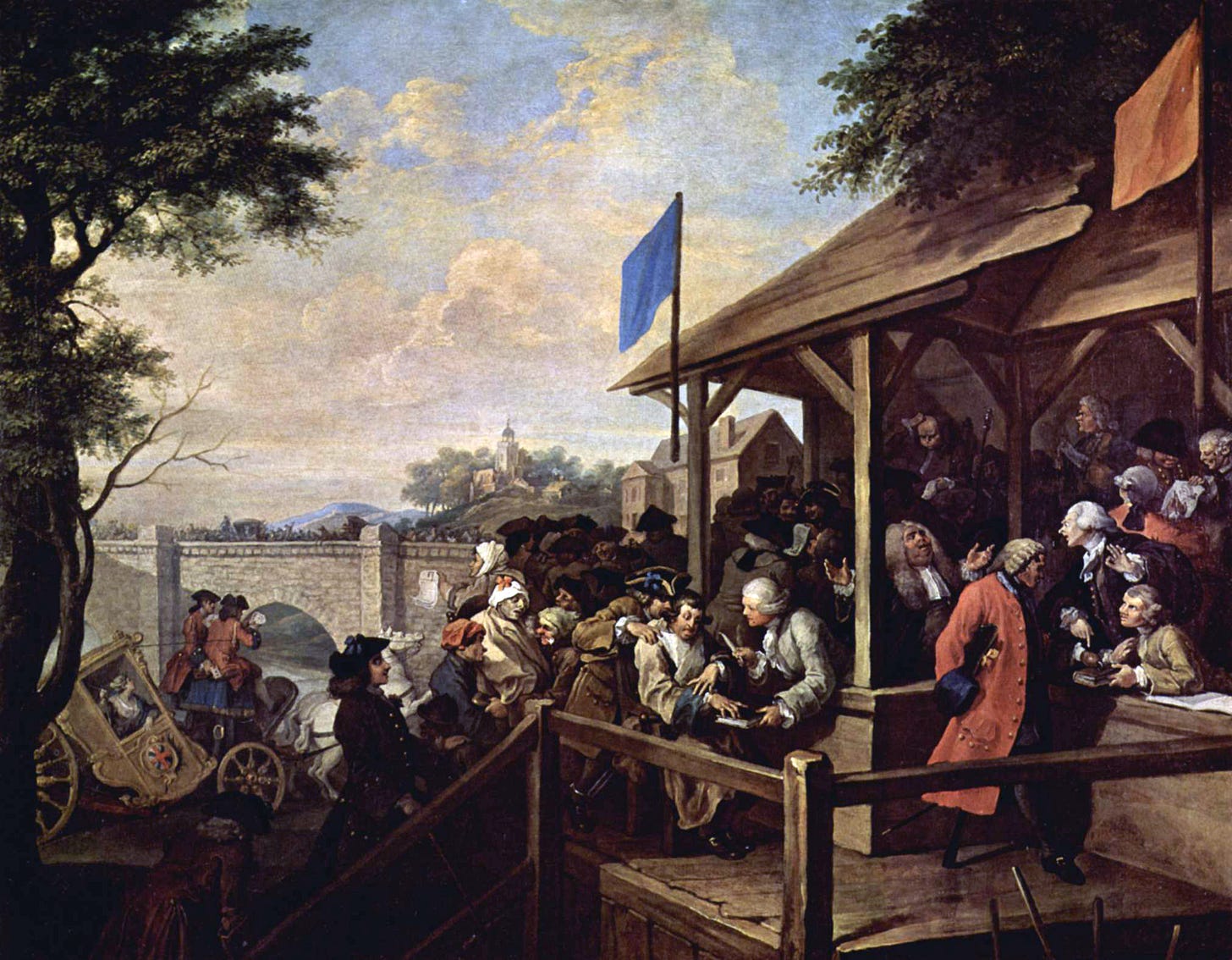Electoral Choice from the Point of View of the Ethical Trinity
Mapping utilitarianism, deontology, and virtue ethics to the ways of picking who I'll vote for, because why not
It’s election season in Montreal, at the city level, and I have no idea who to vote for.
(And I have to decide quickly, because the election is tomorrow. I meant to write this post a month ago, but life got in the way, as it is wont to do.)
Municipal elections here are interesting because, although they involve political parties, there usually isn’t a very strong ideological component to any of it. Abstract ideas like “left” or “right,” “conservative” or “progressive,” “federalist” or “sovereigntist”1 don’t really matter: the issues are more local, more concrete. There isn’t any alignment between municipal parties and national ones.2 You can spend more than a decade as an elected politician without your own kids ever really knowing what you believe in, politically. (I’m the kid. My dad was a city councillor in the city of Lévis, near Quebec City, for 12 years, and I still don’t what his political alignment was or is, if any.)
In Montreal, you can vote for Projet Montréal, Ensemble Montréal, Transition Montréal, Action Montréal, or Futur Montréal. Good luck inferring anything from their names. Or from the nondescript signs that they have been putting up all over the city, showing little more than the faces and names of the candidates.
In practice, you can get some knowledge from just having lived here for a while, and/or from following the news a little bit. For example I know that Projet Montréal currently controls the mayorship and most of the council. The current mayor, Valérie Plante, is retiring, but the candidate to replace her is the #2 most important person in the administration, so one can expect more of the same if Projet Montréal win again (more bike lanes, mild hostility to cars, a vaguely left-wing and environmental-friendly vibe, somewhat higher taxes). Ensemble Montréal is the party that most recently lost power, in 2017, and is now headed by a former federal minister who seems to be vaguely more pro-business and economic development. Transition Montréal uses orange, which has become the traditional left-wing color in Quebec and Canada; it’s a new party, led by a man who is associated with the federal left-wing party. Action Montréal and Futur Montréal are more obscure.
In practice it’s between Projet’s Luc Rabouin and Ensemble’s Soraya Martinez Ferrada. A few polls suggest that Martinez Ferrada will win, but there are a lot of undecideds, like me.
How will we all decide? I think there’s a cute analogy with ethical theories, which suggests that there are, broadly speaking, three strategies that people use to make a choice in an election.
In Ethics and the Complexity of Models, I attempted to un-confuse myself about the distinctions between utilitarianism, deontology, and virtue ethics. I determined that the most significant difference between them is how they each manage the complexity of the world:
Utilitarianism is about building a very complex and accurate model of the world, calculating the positive and negative consequences of everything, which works great in theory but is insanely hard to do.
Deontology is about using a simplified model that captures something important in a small set of rules, at the risk of neglecting other concerns.
Virtue ethics is about borrowing a complex model that already exists and is embodied in another person that is perceived as virtuous.
Since then I’ve become obsessed with analyzing everything through this 3-way lens: making a complex model, making a simple model, and using a borrowed model. Applying it to electoral choice, we get:
Utilitarianism maps to studying the propositions of the candidates in detail and weighing them according to your preferences. Maybe I care a lot about building more bike lanes, but would prefer lower taxes and more deregulation in housing, and two dozen other concerns besides. I could devise an actual mathematical model: out of 100 arbitrary points, I assign 5 to bike lanes, and consider that Projet Montréal has 90% alignment with my preference, while Ensemble Montréal has only 60% alignment (they don’t want to destroy the existing ones but slow down on adding new lanes), so Projet gets 4.5 points and Ensemble gets 3. Then I do this for housing, which is more important to me (20 points), and then taxes, etc. etc. Of course, I am more likely to do this implicitly than actually do the math, just like utilitarians usually do for ethics. But even more likely, I won’t do any of this; I won’t even read the propositions of the parties beyond whatever transpires in the few media articles I will read.
Which brings us to deontology, whose equivalent is picking one or two principles, and voting according to this without thinking too much about the finer-grained detail. In larger-scale elections, this often means following party loyalty, or left-right alignment. It can also mean being a “single-issue voter” who cares a lot, e.g., about abortion, or housing, or immigration, and voting for whichever team is most aligned with you on that one particular question. In Montreal this will happen insofar as people perceive Projet to be left-wing / progressive and Ensemble to be not that. Or it might just come down to bike lanes, which we’ve become somehow rather obsessed with.3
Virtue ethics, meanwhile, maps to primarily selecting a person rather than ideas or policies. You vote based on whoever seems the most suited for the job. Unless you personally know them, which is rare in politics (it happened to me when I voted for my dad), your model of the candidates will necessarily be simplified. But this can work anyway, because we humans are pretty good at assessing the quality of people based on only a few cues. I think this mode also explains incumbent advantage: if a person has been an elected official for some time, and did a reasonable job, it’s pretty easy to trust that they are virtuous enough to keep the job. (I would probably vote for Valérie Plante again if she hadn’t declined to run, and part of why I’m unsure who to vote for is that I don’t really know the two leading candidates all that much.)
Just like in actual ethics, none of these three approaches is inherently superior to the others.
The “utilitarian” mode may seem better in theory, and a lot of commentators bemoan the fact that people are uninformed and vote based on superficial concerns. But it is costly, and it’s totally fine for most people to just not care that much about the fine-grained detail.
The “deontology” approach certainly leads to suboptimal outcomes sometimes, for example voting for a party you don’t actually like that much just because they’re aligned with you on your top issue. But if we want most people to participate in democracy, simplifications like this are necessary. Party politics and divisions like left vs. right make the game much more legible to most of us.
And the “virtue ethics” approach of electing a person rather than ideas might appear shallow, and lead to undesirable results like populism. But it is, in a way, time-tested: referenda are rare and typically garner far less attention than the personalities of the people who run for office. It really is more intuitive for us to judge people rather than abstract concepts.
In practice, we all do a little bit of each, in varying proportions. And ultimately it doesn’t matter that much what approach you choose: one of the reasons democracy works well is that it aggregates the choices of so many people that any one person’s choice doesn’t matter that much. So we end up with a result that somehow reflects the population’s preferences for the specific policy points, for overall ideological alignment, and for the qualities of the people involved. It doesn’t work perfectly, obviously. But that’s what democracy is. It’s imperfect by design, and that’s why it works well.
Thanks to Andrew Burleson for comments on a very early draft of this post.
In Quebec, federalism (pro remaining in Canada) vs. sovereigntist (pro leaving Canada) has been the main political divide since the 1970s.
Whether you consider “national” to mean Quebec or Canada, both of which are common usage.
An aside: I recently visited Santa Fe, in New Mexico. A friend’s friend who lives there told us about a hot-button local political issue. In the city’s main square there used to be an obelisk called the Soldiers’ Monument. The monument has been controversial because of its references to the local indigenous people (“savage Indians” engaged in battles against the soldiers the monument commemorates). In 2020, protesters toppled the monument, and apparently it became the talk of the town for the next few years: what should we do with the obelisk, and with the people who brought it down? It’s apparently still an issue in the upcoming election three days from now. My friend’s friend said he felt like the only person in the whole town who cared about any issue other than the obelisk, such as education or whatever. We might say this is a failure mode of the “deontology” approach: sometimes one particular way of simplifying electoral choice becomes so salient that it overshadows everything else.







